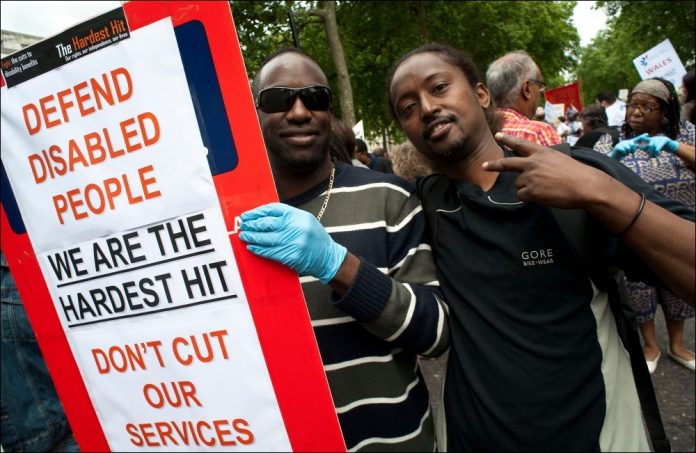David Maples, Disabled members’ candidate in the Unison national executive council elections (personal capacity)
After the experience of the pandemic, 565,000 people, predominately aged 50 to 64, have left the workforce. All over the economy, there is a shortage of workers.
Ignoring their rundown of health services and social care, and the backlog of urgent procedures, the Tory government is now desperately scratching around for solutions. Ending low pay with a minimum wage of at least £15 an hour, and providing affordable childcare, with costs fully met through benefits, would be a good start.
The government is even looking to disabled workers, so time for some home truths.
Six in ten of all deaths from Covid were disabled people. If you were disabled and male, you were 6.5 times more likely to die from Covid than a non-disabled man. Disabled women were 11.3 times more likely to die than non-disabled women.
In the 2008-09 recession, disabled workers were more likely than non-disabled workers to experience negative changes to terms and conditions and working practices – such as wage freezes, reduced overtime and the reorganisation of work. During economic upturns, disabled workers are the last to gain employment, and during downturns we are first to lose our jobs.
Pandemic
Until the pandemic, most employers were reluctant to allow homeworking. But a survey by the Unison trade union found that 73% of disabled workers were more productive or just as productive working from home.
Reasons included a reduced impact on pain and fatigue due to less commuting and the ability to work more flexibly, with additional breaks or a later starting time. The same survey found that a reduced number of disabled workers took sickness absence as they were able to manage their condition better when working from home. Redundancy rates are 62% higher for disabled than non-disabled workers.
Disabled workers face double discrimination. Not only are we less likely to be in work, but when we are, we are paid less than non-disabled workers. Research by the Trades Union Congress (TUC) shows that disabled workers face 20% lower pay – the equivalent to earning £2.10 less an hour.
Changes to the welfare system over the past 12 years have left disabled adults four times worse off financially than non-disabled adults. Nearly half of those in poverty – 6.9 million people – are from families which include a disabled person. TUC research found that disabled people are more than three times as likely to have used food banks as non-disabled people.
Benefit sanctions do not move disabled people closer to paid work. Instead, they often worsen many disabled workers’ existing illnesses and conditions, particularly their mental health.
The pandemic worsened existing accessibility, isolation and disability rights barriers. Disabled women were already twice as likely as other women to experience domestic abuse.
The Tory-LibDem coalition government from 2010 saw disabled people as a soft target. A strategy of whipping up prejudice against disabled people was designed to divide the working class.
The Tories used this to help push through tens of billions of pounds worth of austerity cuts, to attack the benefits disabled people need for a reasonable standard of living.
But during the austerity years, two million public sector workers took strike action for their pensions. And protests by disabled activists helped to counter the Tories’ rhetoric too.
George Osborne, the then Tory chancellor, was famously booed by 80,000 people when presenting medals at the Paralympics in 2012.
Disabled people will return to the methods of protest. And we need strong workplace union organisation too.
The trade unions are the most powerful organisations that exist. Together we can fight for the rights and livelihoods of all workers.
The Socialist Party demands:
- Trade union control over health and safety, and the ‘Access to Work’ service
- ‘Reasonable adjustments’ – changes that workplaces are supposed to make so disabled people are not disadvantaged – must be something the whole union movement fights for
- Benefits must be based on the real cost of living and the real cost of disability
- Democratic working-class control over the benefit system to make it supportive rather than punitive
- Full pensions with no reductions because of lower pay or a shorter working lifetime







